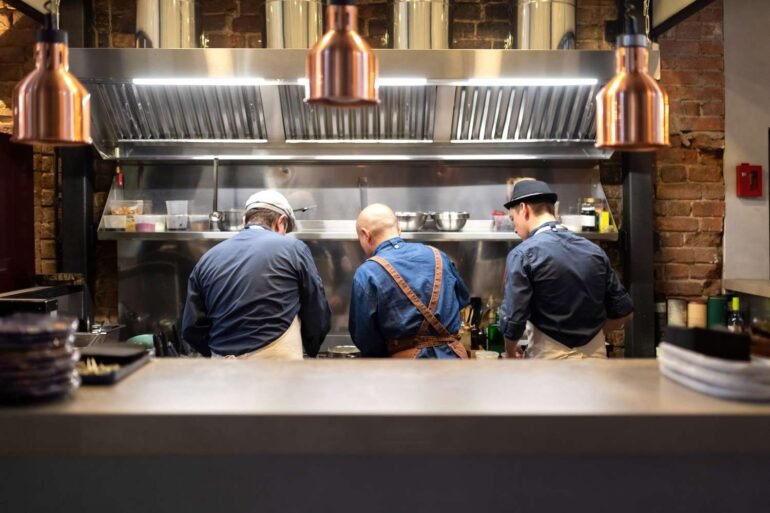:max_bytes(150000):strip_icc():format(jpeg)/The-People-Making-Your-Meal-FT-DGTL1025-bef36224e2064aa29c75ffa72e1fe5ca.jpg)
- The magic is disciplined people and systems, not just perfect food.
- Restaurants are America’s training ground with real mobility from dishwasher to owner.
- Mise en place and 10-minute debriefs turn chaos into consistent calm.
- The job is demanding; mental health and thin margins need care.
- Support the system: be kind, tip well, and invest in people.
Here’s the “secret” I wish every guest knew about the people cooking their dinner and running their drinks: These hospitality pros are world-class problem solvers who can turn total chaos into effortless hospitality with a roll of tape, a Sharpie, and a calm “We’ve got it.” Having spent my life in this business, I can tell you the real magic isn’t a perfect sauce or a freshly picked garnish. It’s the humans who choose, night after night, to make something beautiful under extreme pressure.
This is a peek into the small choices that restaurant workers make to ensure that your experience is magical and why they’re equipped to handle any crisis that comes their way now or in the future.
Restaurants are America’s unofficial training ground
First bosses become first mentors. Dishwashers become prep cooks and then become sous chefs or even owners. The pipeline is not a myth because according to the National Restaurant Association, 63% of U.S. adults have worked in restaurants, 9 in 10 managers and 8 in 10 owners started in entry-level roles, and most restaurants are small, local businesses. Additionally, 7 in 10 are single-unit and 9 in 10 employ fewer than 50 people. These places teach leadership one pre-shift at a time and keep neighborhoods stitched together in a way that spreadsheets can’t capture.
That means that any given neighborhood restaurant is teaching hard and soft skills to an emerging group of professionals who will carry those skills with them the rest of their lives. Restaurants don’t just show up and feed you; they feed the flywheel of human development. That’s more than I can say for just about any other industry.
On any random Tuesday, a line cook is learning cost control by weighing sugar to the gram while a server is rehearsing a two-sentence upsell with the timing of a stand-up comic. Tomorrow, both might be training a new hire. That’s not luck — that’s a system.
Pros set themselves up for success
Great teams don’t rely on glamorized heroics — they rely on mise en place (having tools and ingredients ready, every time), station choreography, and tiny feedback loops within the organization. The quiet power move is a 10-minute post-service debrief on what worked, what will change tomorrow. Do that 200 nights a year and watch an average team become a great one. An employee who began with a lack of confidence or timid guest interaction became a world-class operator. I’ve seen it firsthand.
Matthew Jennings
We build service out of imperfect days and we carry each other through them.
— Matthew Jennings
Hospitality often comes at a cost to the people serving it
Hospitality is joyful, and it’s also demanding, with long hours, high emotion, and tight margins. The mental load is real. In one of the largest industry surveys of its kind conducted by The Burnt Chef Project, 8 in 10 hospitality professionals reported experiencing mental health issues related to their work. If you’ve ever watched a cook plate a perfect halibut while silently rearranging child care, or witnessed a manager defusing a heated table and then rewriting someone’s schedule to care for their ailing parents or navigate a volatile relationship with a spouse or coordinate a school bus drop-off, you know exactly what I’m talking about. We build service out of imperfect days and we carry each other through them.
Decisions don’t happen on a whim
The economics are better than they used to be in some markets, but the math is still super tight. According to the Bureau of Labor Statistics, the median annual wage for chefs and head cooks is about $61,000, while restaurant cooks sit much lower on the ladder. Margins for many independent restaurants still live and die by a point or two of food or labor cost. That’s part of why menus evolve. Love is in the dish’s final touch, but survival is in the spreadsheet. When you see a price shift or a new special, it’s rarely an eye toward trendiness. It’s more than likely because we’ve found a better vendor, integrated smarter prep, or discovered a tweak that protects quality and people.
Matthew Jennings
Love is in the dish’s final touch, but survival is in the spreadsheet.
— Matthew Jennings
Today’s pros are wildly multidisciplinary
Your bartender is part beverage strategist, part therapist, part traffic controller. They’re reading the room for everyone. And as guest tastes evolve, teams evolve, too. The rise of nonalcoholic programs isn’t an afterthought; it’s pure hospitality. We’re designing serious zero-proof options so the entire table can feel included, and the data from global data and insights provider ISWR backs that shift. The U.S. no-alcohol market is forecast to grow sharply through 2028, with billions in value and sustained gains across beer, ready-to-drink, and beyond. Offering great nonalcoholic options isn’t just kind — it’s smart business. These sorts of cascading trends show that we are hell-bent on innovation, and that we are actually listening to our customers.
Your dining delight is by design
Another thing restaurants don’t advertise is that the calm you feel in a dining room is completely engineered. We label, date, take temperatures, and taste. We stretch that blue tape like violin strings across hotel pans so the walk-in reads like a beautiful storyboard. We build “if-then” scenarios for when the fryer dies at 7:15, the barback no-shows, the big table wants to split the check eight ways, or a thunderstorm comes out of nowhere and the sky opens up right over the patio. Good service feels effortless because dozens of tiny efforts are landing in sequence. That ease of pivot is designed. It’s built into our DNA. It’s intuitive.
Culture is key
Hospitality workers have culture in spades, and this matters as much as the craft of it all. Restaurants carry neighborhoods on their shoulders. They have birthday candles at the ready, a server who knows your kid’s nut allergy by heart, or a cook who shares how their grandmother breads her chicken parm and suddenly it’s the staff meal everyone waits for. I’ve watched shy dishwashers become confident line cooks and then leaders who operate with integrity and heart. When a place invests in people (with predictable days off, real breaks, and true coaching instead of shouting), you can taste it. And guests come back because they can feel it. I know this to be true.
This is where you come in. If you’re a guest, here’s how to be a partner to the magic.
Be a great guest
Lead with kindness
The team is juggling a dozen invisible problems so your night feels effortless. Try to remember that and bring empathy to the table.
Value the craft
Ask about a dish; you’ll learn something, and you’ll make someone’s night. No, really. We love that.
Tip like you mean it
It lands. Hard.
Champion places that champion people
If a restaurant talks openly about mental health and growth, they’re building a better industry. (If you’re an operator looking for resources, organizations like The Burnt Chef Project offer training and support and the Southern Smoke Foundation has resources for hospitality workers in crisis.)
And if you’re an operator, here are three moves I suggest you can make this week.
Manage with a people-first mindset
Put wellness at the center of the plate
Post the schedule earlier. Protect days off. Build a real break into every shift because it matters.
Coach, don’t just correct
Go with a two-note debrief on what worked and what changes tomorrow. Keep it short. Make it a ritual. Get buy-in and repeat.
Make growth visible
Put a skills ladder on the wall so a dishwasher can literally see the path to prep, to line, to leadership. Career tracks work. Help remove their roadblocks.
Matthew Jennings
The next time your plate lands in front of you, know that there’s a chain of care behind it.
— Matthew Jennings
This is the secret sauce of a seamless meal
I’ve cooked for presidents and pre-theater families, for first dates and yearly family reunions. The only constant is the way we show up as leaders, and how — or if — we resonate with our crews. Mine are typically funny, stubborn, generous, wildly capable humans who show up with oven-scarred arms, spotless uniforms, and the belief in the duality that every service can be challenging but equally as fun and rewarding. None of us are wizards behind a curtain. We’re just swivel-headed servants who learned to orchestrate a small miracle between 5 and 10 p.m. every day.
The next time your plate lands in front of you, know that there’s a chain of care behind it. Someone fussed over the brunoise because size matters. Someone redesigned a station so your entrée didn’t wait on the grill pickup. Someone wrote (and rewrote) a script so your server could recommend the nonalcoholic spritz with confidence and not cannibalize the classic sour. Someone ran the numbers so the signature dish you loved last year could still exist this year without squeezing the people who grow it, or make it.
What restaurants don’t want you to know about the people making your meal? Maybe it’s simply that there’s nothing to hide. We ain’t perfect — in fact, far from it. But we are professionals, and we’re building better systems and better workplaces in an industry that millions of Americans pass through and many of us choose to call home. If you taste the calm, it’s earned. If you feel seen, believe me, it’s by design. And if you leave happier than you arrived, then a lot of ordinary, disciplined work just added up to something a little extraordinary.
Get the F&W Pro Newsletter
Sign up for the biweekly F&W Pro Newsletter and you’ll get stories like this delivered straight to your inbox, along with insights, pep talks, and wisdom from some of the best people in the hospitality business. Learn more here.
Matt Jennings
2025-10-08 17:30:00

